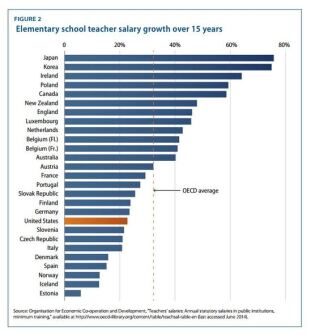Which states pay their experienced teachers the worst?
A new report by the Center for American Progress argues that teachers not only have bad starting pay in many states, but also that teachers are unlikely to see major salary gains even after several years of teaching.
The study by the Washington-based liberal think tank collected information from every state except Hawaii (not enough data) to look at the average teacher’s salary in each state 10 years after commencing teaching, what the highest possible salary was, and how many teachers had second jobs.
South Dakota pays its mid-career teachers the worst of any state, the authors found, with an average 10-year salary of just $33,100, and the salary schedule maxes out at the lowest of any state, too, at $43,600. The state’s median household income? $49,000. Even adjusting for cost of living, it’s low.
Growth in teacher salaries is especially bad when comparing the U.S. to other developed countries:

In only four states—Connecticut, Maryland, New Jersey, and New York—can teachers max out on the salary schedule above $80,000. New York offers the highest such rate in the country, at $90,700.
“The bottom line is that mid- and late-career teachers are not earning what they deserve, nor are they able to gain the salaries that support a middle-class existence,” the report said.
Bright Spots, Depending on Whom You Ask
The report lists two hopes for better teacher salaries: Performance pay and PD-based pay. The former practice relies on tying salary increases and bonuses to improvement in student test scores, a practice that many teachers generally revile and deem to be flawed.
The report singles out D.C.'s IMPACTplus program, which offers potentially huge rewards to “effective” teachers working in the district’s low-income schools, where an annual bonus could reach up to $25,000. (That is just shy of the average starting salary for a South Dakota teacher.) That promotion would certainly sit well with TNTP, which released a report July 18 again calling for more such performance-pay systems.
The IMPACT system, though, while being further advanced than many state teacher-evaluation systems, also drew scrutiny when, in December 2013, 44 teachers’ evaluations turned out to be incorrectly calculated, resulting in the accidental firing of one of those teachers. At least one study last year, however, found the IMPACT system had caused achievement gains.
Professional learning-based pay pegs a teacher’s salary to the fervor with which teachers develop their skills. The CAP report specifically mentions the Portland, Ore., system that rewards teachers for taking PD classes.
Caveats
Salary alone does not a happy teacher make, as the report acknowledges. Many teachers also wish for greater classroom autonomy, and, as a separate CAP report found in January, South Dakota offers that in spades. That goes for North Dakota as well, though North Dakota also offers both better starting teacher pay and a higher ceiling.
(There’s no level-of-autonomy-per-dollar-paid statistic, but a cursory review of both reports would suggest that D.C. and New York would lead the pack. Rhode Island had the best 10-year salary, but also reported a relatively low amount of autonomy.)
And of course there’s school climate, opportunities to advance, access to professional development, the students themselves, etc., to consider when weighing what makes a teacher happy. But having a roof and food and some cash left over for Netflix are probably up there in the rankings.
One other note: The report does a lot of salary comparison between teachers and other career choices:
In 11 states, the average base salary for a teacher with 10 years of experience and a bachelor’s degree is merely $39,673—less than a carpenter’s national average salary.*
It strikes me as a little unnecessary, like an invitation to pit people of different careers against each other, when many would probably agree with a broader assertion that a lot of people aren’t getting paid enough to get by, much less to do their jobs.
*Pity the shop teachers, who must have no good options for their skills.
Image source: Center for American Progress


